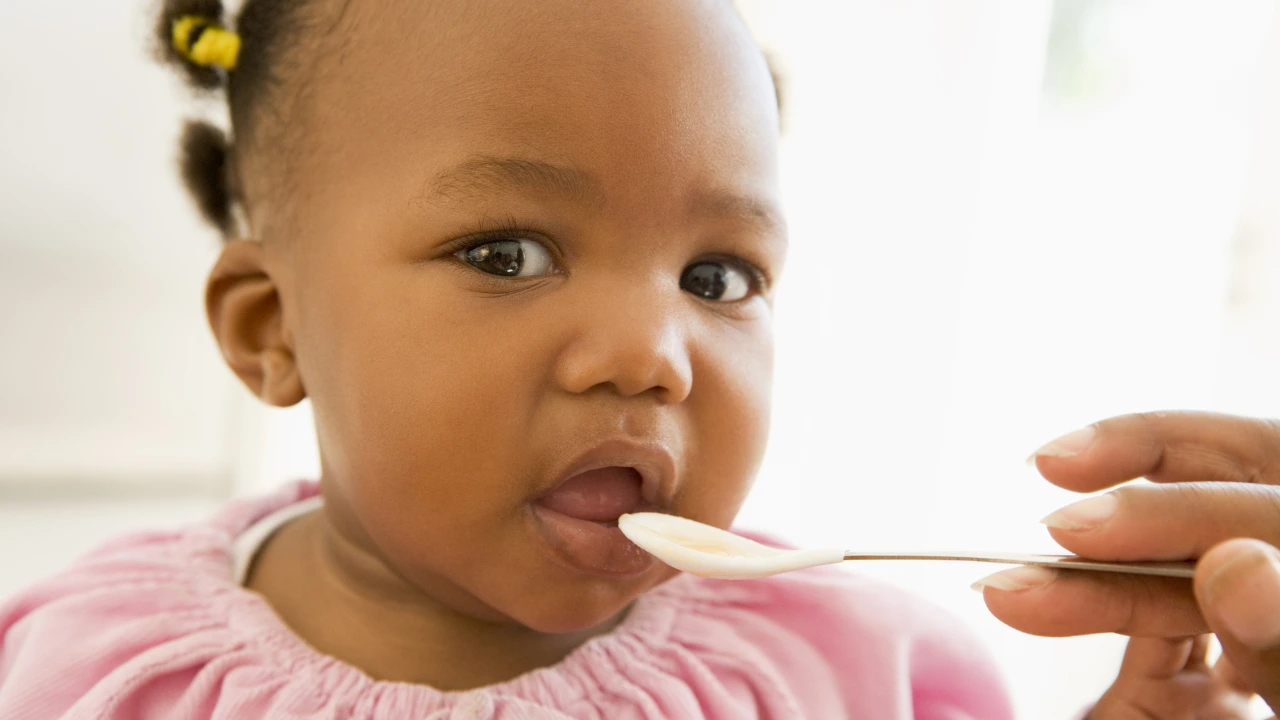
Foods to avoid giving your baby include honey, cow’s milk, soy milk, fruit juice, sugar-sweetened beverages, unpasteurized foods, and foods with added sugars or too much sodium. Choking hazards are a serious concern, so don’t offer large chunks, raw vegetables, nuts and seeds, hard or crunchy foods, sticky foods, or dollops of nut butters. If allergies run in your family or your baby has eczema, check with the doctor about introducing allergenic food such as eggs, peanuts, tree nuts, wheat, soy, fish, and shellfish.
IN THIS ARTICLE
- Foods to avoid: Birth to 6 months
- Foods to avoid: 6 to 12 months
- The latest on children and food allergies
As your baby grows, they’ll be eager to sample food from your plate – and you’ll be eager to introduce some variety. But not all foods are safe for your child.
Foods to avoid: Birth to 6 months
All food and beverages except breast milk or formula: Paediatricians recommends feeding your baby only breast milk or formula for about the first 6 months.
Foods to avoid: 6 to 12 months
Honey: Honey can harbor spores of Clostridium botulinum, which causes botulism. An adult’s intestinal tract can prevent the growth of these spores, but in a baby the spores can grow and produce life-threatening toxins.
Cow’s milk and soy milk: Stick with breast milk or formula until your child’s first birthday. Why? Your baby can’t digest the proteins in cow’s milk and soy milk during the first year, and these beverages contain minerals in amounts that can damage your baby’s kidneys.
Baby-led weaning means skipping purees and spoons – and letting babies feed themselves. Discover nine great finger foods to offer to your baby.
Fruit juice and sugar-sweetened beverages: Juice (even 100 percent fruit juice) and sugar-sweetened beverages such as soda and sports drinks aren’t recommended for children under 12 months. When babies fill up on these drinks, they miss out on getting the nutrients they need. And though fruit juice seems healthy, it has far more calories and sugar than fresh fruit and can contribute to weight gain and tooth decay. The doctors recommends no fruit juice for babies, and just 4 ounces per day maximum for toddlers ages 1 to 3.
Unpasteurized foods: Don’t give babies and children unpasteurized juice or cider or unpasteurized (raw) dairy products. These may contain harmful bacteria and parasites that can lead to serious illness or death.
Added sugars: Avoid added sugar in the diets of children under age 2, paediatricians advise. These are sugars and syrups that are added to foods or beverages when they are processed or prepared. This doesn’t include sugars found in milk and fruits. Too much added sugar in children’s diets has been linked to obesity and increased risk for future health problems such as diabetes and heart disease. Check the Nutrition Facts label on packaged foods, and avoid those that list 1 g or more of “Added Sugars.”
Too much sodium: Sodium is an essential nutrient primarily consumed as salt. However, too much can be harmful. Children this age don’t need more than 1,200 mg of sodium per day. Check the Nutrition Facts label when buying canned, frozen, and packaged foods.
Large chunks: A chunk of food can get stuck in your baby’s throat. The AAP recommends that you cut food into pieces no larger than 1/2 inch. For example, cut up fruits such as grapes, cherry tomatoes, and strawberries, and shred or finely chop meats, vegetables, and cheeses.
Raw vegetables: Soft-cook vegetables such as carrots, celery, and broccoli, and dice, shred, or cut them into pieces no larger than 1/2 inch before serving.
Nuts and seeds: Remove seeds and pits from fresh fruit such as watermelon, peaches, plums, and cherries before serving. And don’t feed your baby nuts or seeds, such as sunflower or pumpkin seeds. Seeds may be too small to choke on but can get stuck in a child’s airway and cause an infection.
Hard or crunchy foods: Nuts, popcorn, and pretzels are all choking hazards, as are all hard candies and cough drops.
Sticky foods: Chewing gum and sticky foods – such as jelly or gummy candies, dried fruit, and marshmallows – can get lodged in your baby’s throat. Stringy, melted cheese can also be a choking hazard.
Nut butter: The sticky consistency of peanut butter and other nut butters can make it hard for your baby to swallow it. Spread nut butter thinly on bread or crackers. Or thin it with water or applesauce.
The latest on children and food allergies
Doctors used to recommend waiting until age 1 or even later to introduce solid foods that are common allergens, especially with children at risk for allergies. But the doctors has changed its tune, because studies show that these delays don’t help prevent allergies and may even increase the risk of them.
You may be told to introduce foods one at a time, waiting three to five days after each new food to watch for any allergic reaction. Or your doctor may say it’s fine to start multiple new foods at once. If you believe your baby is likely to have food allergies – for example, if allergies run in your family or your baby has eczema – check with their doctor to determine the best strategy for introducing allergenic foods, which include eggs, milk, peanuts, wheat, soy, tree nuts, fish, and shellfish.


Add a Comment